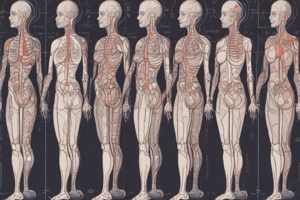Podcast
Questions and Answers
Which gland helps balance salt and water levels in the body?
Which gland helps balance salt and water levels in the body?
- Pituitary gland
- Thyroid gland
- Pancreas
- Adrenal glands (correct)
What is the function of cortisol produced by the adrenal glands?
What is the function of cortisol produced by the adrenal glands?
- Regulate salt balance
- Regulate stress response (correct)
- Regulate calcium levels
- Regulate blood sugar levels
Which gland regulates metabolism and energy levels in the body?
Which gland regulates metabolism and energy levels in the body?
- Pituitary gland
- Thyroid gland (correct)
- Adrenal glands
- Pancreas
In case of hypothyroidism, what symptoms might a person experience?
In case of hypothyroidism, what symptoms might a person experience?
Which gland releases small amounts of sex hormones like testosterone and estrogen?
Which gland releases small amounts of sex hormones like testosterone and estrogen?
Which gland is the 'master gland' responsible for regulating the functions of other endocrine glands?
Which gland is the 'master gland' responsible for regulating the functions of other endocrine glands?
Which hormones does the pancreas produce to regulate blood sugar levels?
Which hormones does the pancreas produce to regulate blood sugar levels?
Where is the thyroid gland located in the body?
Where is the thyroid gland located in the body?
Which organ sits atop the kidneys and is responsible for producing hormones related to stress response?
Which organ sits atop the kidneys and is responsible for producing hormones related to stress response?
Imbalances in which hormones can lead to conditions like hyperthyroidism or hypothyroidism?
Imbalances in which hormones can lead to conditions like hyperthyroidism or hypothyroidism?
What are the two main components of the central nervous system (CNS)?
What are the two main components of the central nervous system (CNS)?
How do neurons communicate with each other?
How do neurons communicate with each other?
What is the role of neurotransmitters in the nervous system?
What is the role of neurotransmitters in the nervous system?
Where do neurotransmitters transmit signals across to enable communication between neurons?
Where do neurotransmitters transmit signals across to enable communication between neurons?
How many different neurotransmitters have been identified in the nervous system?
How many different neurotransmitters have been identified in the nervous system?
Which type of neurotransmitters suppress the receiving neuron, making it less likely to fire an action potential?
Which type of neurotransmitters suppress the receiving neuron, making it less likely to fire an action potential?
What is the role of dopamine and serotonin among neurotransmitters?
What is the role of dopamine and serotonin among neurotransmitters?
Which neurotransmitter stimulates the receiving neuron, making it more likely to fire an action potential?
Which neurotransmitter stimulates the receiving neuron, making it more likely to fire an action potential?
What essential functions are neurotransmitters crucial in maintaining within the nervous system?
What essential functions are neurotransmitters crucial in maintaining within the nervous system?
Flashcards are hidden until you start studying
Study Notes
Endocrine Glands: Navigating the Hormonal Highway
Endocrine glands are the body's chemical communicators, releasing hormones that regulate everything from growth and metabolism to mood and sleep. Let's dive into the four major endocrine glands—the pancreas, thyroid, pituitary, and adrenal glands—to understand their roles in our health and well-being.
Pancreas
The pancreas is a dual-purpose organ, producing both hormones (insulin and glucagon) and digestive enzymes. Its hormones regulate blood sugar levels by promoting glucose uptake in cells (insulin) and preventing hypoglycemia (glucagon). The pancreas also plays a role in digestion by releasing digestive enzymes into the small intestine.
Thyroid Gland
The thyroid gland, located in the neck, produces hormones that regulate the body's metabolism, growth, and development. Its primary hormones are thyroxine (T4) and triiodothyronine (T3). Imbalances in these hormones can lead to conditions such as hyperthyroidism (overactive thyroid) or hypothyroidism (underactive thyroid).
Pituitary Gland
The pituitary gland, often referred to as the "master gland," is responsible for producing and releasing hormones that regulate the functions of other endocrine glands. It plays a crucial role in growth, development, metabolism, and reproduction by controlling the production of hormones in the adrenal glands, ovaries, and testes.
Adrenal Glands
The adrenal glands are two small organs that sit atop the kidneys. They produce and release hormones such as cortisol (which regulates stress, blood pressure, and immune system function) and aldosterone (which helps balance salt and water levels in the body). The adrenal glands also produce small amounts of sex hormones like testosterone and estrogen.
Endocrine glands communicate via hormones, which are released directly into the bloodstream to have effects on distant target organs. The endocrine system's intricate dance of hormones ensures that the human body functions in a harmonious balance. Dysfunction in any endocrine gland can lead to a cascade of symptoms and health issues.
For instance, hypothyroidism, caused by low thyroid hormone levels, can result in fatigue, weight gain, cold intolerance, and depression. Conversely, hyperthyroidism can lead to weight loss, rapid heart rate, and anxiety.
Understanding the roles of these four endocrine glands is essential for grasping the complexity of the human body and how we maintain health through hormonal balance.
Studying That Suits You
Use AI to generate personalized quizzes and flashcards to suit your learning preferences.





